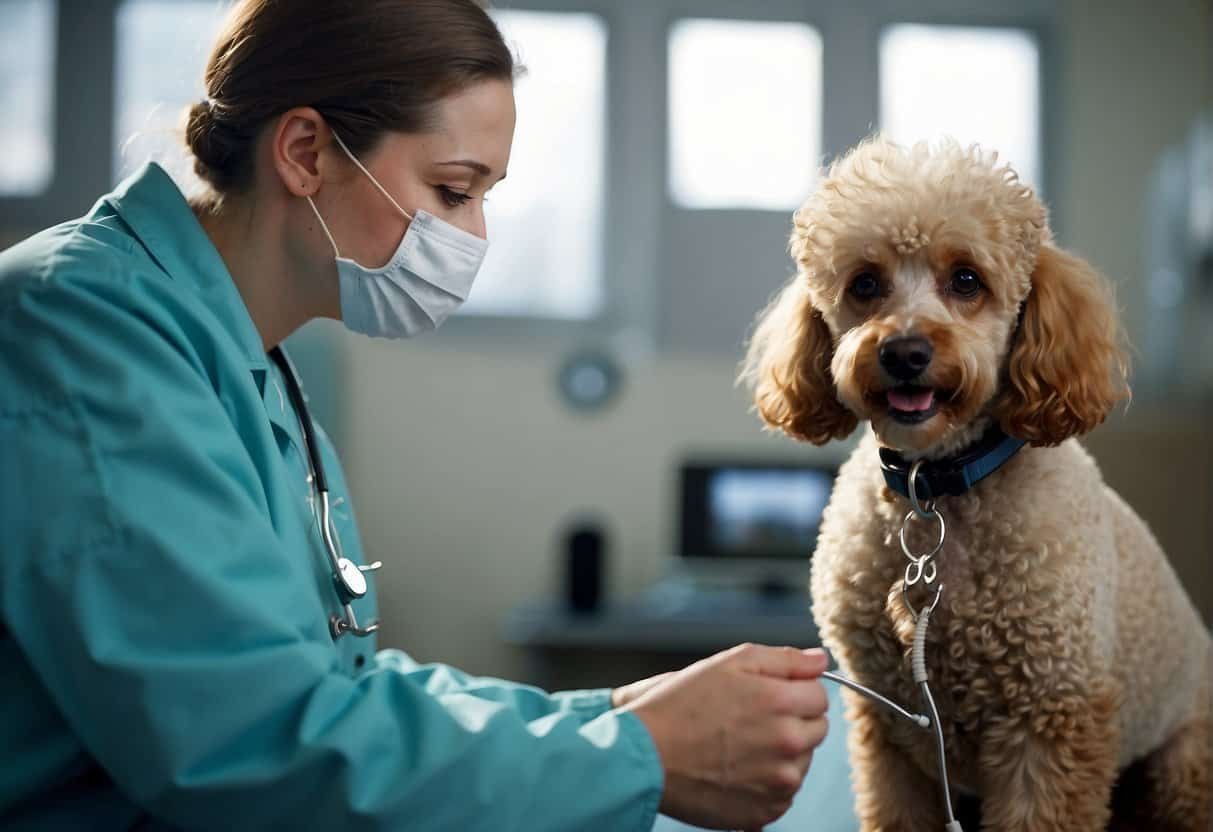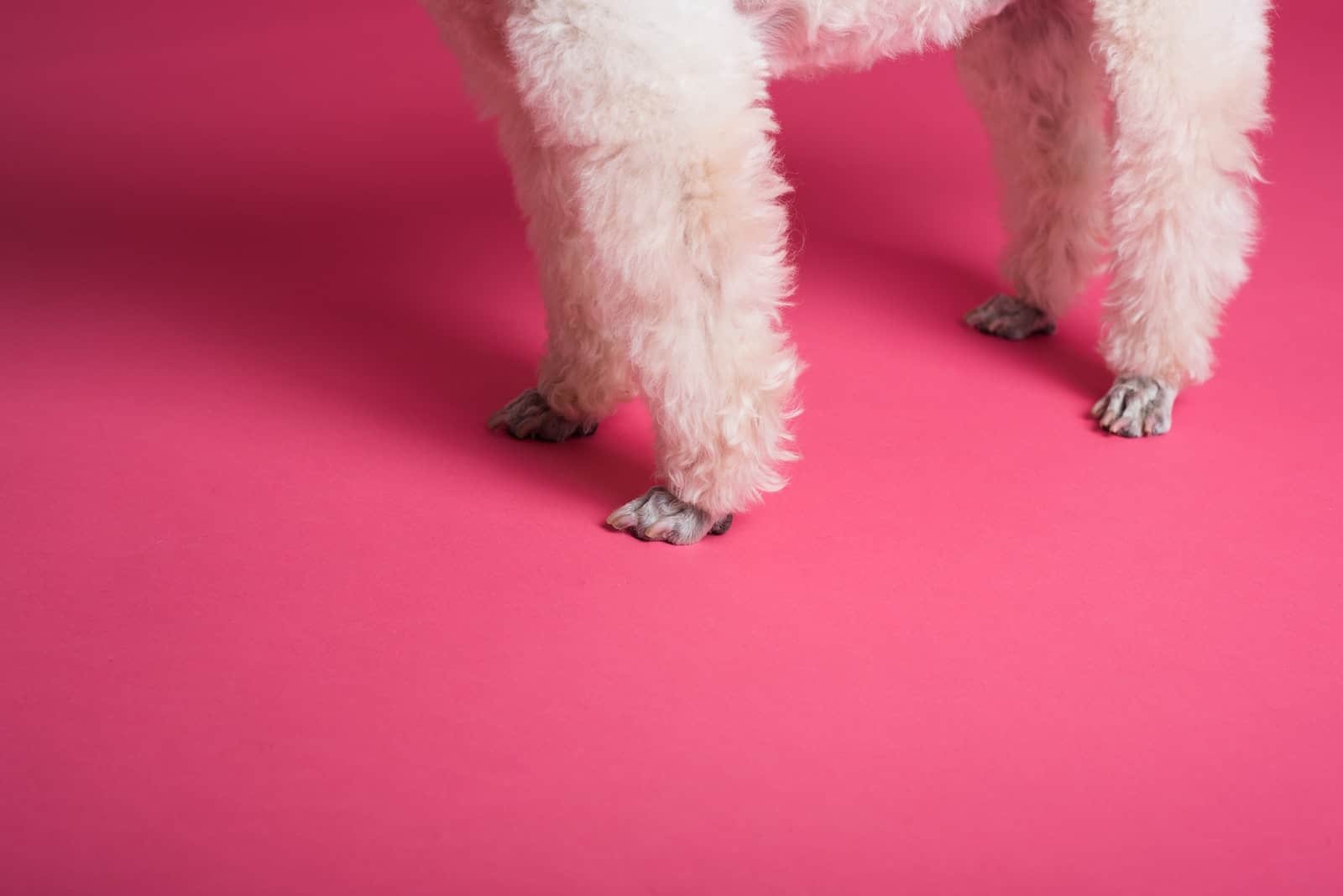Dental care is an essential part of your poodle’s overall health and well-being. Neglecting your poodle’s teeth can lead to a variety of dental problems, including tooth decay, gum disease, and bad breath. Fortunately, there are several things you can do at home to ensure your poodle’s teeth stay healthy and clean.
Understanding your poodle’s teeth is the first step in providing proper dental care. Poodles have 42 teeth, which are divided into incisors, canines, premolars, and molars. Each type of tooth serves a different purpose, and understanding their function can help you choose the right tools and techniques for cleaning your poodle’s teeth. It’s also important to note that dental problems can affect poodles of all ages and sizes, including standard, miniature, and toy breeds recognized by the AKC.
Importance of dental care cannot be overstated. Regular dental care can help prevent dental problems and extend your poodle’s life. Neglecting your poodle’s teeth can lead to serious health issues, including heart disease and kidney problems. By providing proper dental care at home and seeking professional dental care when necessary, you can help ensure your poodle lives a long, healthy, and happy life.
Key Takeaways
- Proper dental care is essential for your poodle’s overall health and well-being.
- Understanding your poodle’s teeth can help you choose the right tools and techniques for cleaning their teeth.
- Neglecting your poodle’s teeth can lead to serious health issues, including heart disease and kidney problems.
Understanding Your Poodle’s Teeth
Quick Start: Follow these steps for best results with your poodle.
As a responsible poodle owner, it’s important to understand the basics of your dog’s dental health. Knowing the different stages of your poodle’s teeth development can help you identify potential dental issues early on and take preventive measures to avoid them. In this section, we’ll discuss the different stages of your poodle’s teeth development, including the teething stage and adult teeth.
Teething Stage
During the teething stage, your poodle will start to lose its deciduous teeth, also known as baby teeth, and grow its permanent teeth. This stage typically starts at around 3 to 4 months of age and lasts until your poodle is about 7 months old. During this time, your poodle may experience discomfort and pain as its teeth start to erupt. You may notice your poodle chewing on objects to alleviate the discomfort.
Adult Teeth
Once your poodle has reached adulthood, it should have a full set of 42 teeth, including molars, premolars, canines, and incisors. The molars are flat teeth located in the back of the mouth, while the canines, also known as fangs, are the sharp teeth located next to the incisors. The incisors are the small teeth located at the front of the mouth and are used for biting and grooming.
It’s important to note that poodles are prone to dental issues, such as plaque buildup and gum disease. Therefore, it’s crucial to establish a regular dental care routine for your poodle to maintain good oral health. This routine should include brushing your poodle’s teeth regularly, using dental chews to keep your dog’s teeth healthy, and feeding your pooch quality food that’s good for its teeth.
In conclusion, understanding your poodle’s teeth development is essential to maintaining good dental health. By knowing the different stages of teeth development, you can identify potential dental issues early on and take preventive measures to avoid them. With a regular dental care routine, you can help ensure that your poodle’s teeth stay healthy and strong for years to come.
Importance of Dental Care
As a poodle owner, it is crucial to prioritize your dog’s dental care. Just like humans, dogs can suffer from dental problems that can lead to discomfort, pain, and even tooth loss. Neglecting your poodle’s dental hygiene can also lead to bad breath, plaque and tartar build-up, and even periodontal disease.
Periodontal disease is a common dental issue in dogs that occurs when bacteria in the mouth form plaque and tartar on the teeth, leading to inflammation and infection of the gums. If left untreated, periodontal disease can result in tooth decay, tooth loss, and even infections that can spread to other parts of the body.
By implementing a regular dental care routine at home, you can help prevent these issues and keep your poodle’s teeth healthy. This routine should include brushing your dog’s teeth, providing dental chews or toys, and feeding them a high-quality diet.
Brushing your poodle’s teeth regularly is one of the most effective ways to prevent dental disease. You can use a soft-bristled toothbrush and canine toothpaste to gently clean your dog’s teeth and remove any plaque or tartar build-up. It is important to start this routine early in your poodle’s life to get them used to the process.
In addition to brushing, providing dental chews or toys can also help keep your poodle’s teeth clean. These products can help remove plaque and tartar build-up and keep your dog’s teeth strong and healthy.
Finally, feeding your poodle a high-quality diet can also contribute to their dental health. Avoid giving your dog sugary or starchy treats and instead opt for dental chews or toys that are specifically designed to promote dental health.
In conclusion, prioritizing your poodle’s dental care is essential to their overall health and well-being. By implementing a regular dental care routine at home, you can help prevent dental disease and keep your poodle’s teeth healthy and strong.
Identifying Dental Problems
Proper dental care is essential for maintaining your poodle’s overall health. However, even with regular brushing and dental check-ups, dental problems can still occur. Identifying these problems early can help prevent them from becoming more severe. Here are some common dental problems that poodles may experience:
Tooth Problems
Broken or chipped teeth can be painful and lead to infection. Missing teeth can also cause problems with eating and lead to further dental issues. Keep an eye out for any changes in your poodle’s eating habits or any signs of discomfort when chewing.
Inflammation
Inflammation of the gums, known as gingivitis, is a common dental problem that can cause pain and discomfort for your poodle. This can be identified by red, swollen gums that may bleed when brushing. If left untreated, it can lead to more severe dental problems.
Drooling
Excessive drooling can be a sign of dental problems, especially if accompanied by other symptoms such as bad breath or difficulty eating. This can indicate tooth decay, gum disease, or other dental issues.
Regular dental check-ups with your veterinarian can help catch these problems early and prevent them from becoming more severe. Additionally, keeping up with regular brushing and dental care at home can help prevent these problems from occurring in the first place.
Choosing the Right Tools
Taking care of your poodle’s teeth is essential for their overall health and well-being. One of the most important things you can do is to choose the right tools for the job. In this section, we’ll discuss the different types of toothbrushes and toothpaste available and what to look for when selecting the best ones for your poodle.
Toothbrushes
When it comes to toothbrushes, there are a few different options to choose from. The most common types of toothbrushes for dogs are pet toothbrushes and finger brushes. Pet toothbrushes are similar to human toothbrushes, but with softer bristles and a smaller head to fit in your dog’s mouth. Finger brushes, as the name suggests, fit over your finger like a glove and have small bristles on the end.
When selecting a toothbrush for your poodle, consider the size of their mouth and teeth. A small toothbrush head is best for small dogs like poodles, and softer bristles are gentler on their teeth and gums.
Toothpaste
Toothpaste is another essential tool for maintaining your poodle’s oral health. There are many types of toothpaste available, including dog-specific toothpaste and human toothpaste. It’s important to note that human toothpaste is not suitable for dogs as it contains ingredients that can be harmful to them, such as xylitol.
When selecting a toothpaste for your poodle, look for one that is non-foaming, non-toxic, and fluoride-free. Dog-specific toothpaste comes in a variety of flavors, such as chicken and beef, which can make brushing more enjoyable for your poodle.
Other Factors to Consider
When choosing toothbrushes and toothpaste for your poodle, there are a few other factors to consider. For example, some toothpaste contains xylitol, which can be toxic to dogs. Always check the label to ensure that the toothpaste you choose is safe for your poodle.
Additionally, if your poodle has a history of dental problems, you may want to consider using a toothpaste that contains enzymes to help break down plaque and tartar. Talk to your veterinarian to determine the best toothbrush and toothpaste for your poodle’s specific needs.
By choosing the right tools for the job, you can help ensure that your poodle’s teeth stay healthy and clean. Remember to brush their teeth regularly and schedule regular dental checkups with your veterinarian to catch any potential problems early on.
Brushing Your Poodle’s Teeth
Brushing your poodle’s teeth is an essential part of maintaining their oral hygiene and overall health. It is recommended that you brush your poodle’s teeth at least two to three times a week to prevent plaque buildup, bad breath, and gum disease.
To brush your poodle’s teeth, you will need a soft-bristled toothbrush and toothpaste specifically formulated for dogs. Human toothpaste is not recommended as it can be harmful to your poodle’s health.
Here are the steps to follow when brushing your poodle’s teeth:
- Start by introducing your poodle to the toothbrush and toothpaste. Allow them to sniff and lick the toothpaste to get used to the taste and texture.
- Gently lift your poodle’s lip to expose their teeth and gums.
- Apply a pea-sized amount of toothpaste to the toothbrush and brush your poodle’s teeth in a circular motion, focusing on the outside surface of the teeth.
- Be gentle and avoid brushing too hard as this can damage the enamel and cause discomfort to your poodle.
- Once you have brushed all of your poodle’s teeth, reward them with a treat or praise to reinforce positive behavior.
It is important to note that brushing your poodle’s teeth should be a positive experience for both you and your poodle. If your poodle becomes agitated or stressed, take a break and try again later.
In addition to brushing your poodle’s teeth, you can also provide them with dental chews and quality food that promotes dental health. Regular check-ups with your veterinarian can also help detect any dental issues early on and prevent them from becoming more serious.
By following these simple steps and incorporating regular dental care into your poodle’s routine, you can help ensure that your furry friend maintains healthy teeth and gums for years to come.
Alternatives to Brushing
Brushing your poodle’s teeth is the most effective way to maintain their oral health, but it’s not always easy to do. Fortunately, there are alternatives to brushing that can help keep your poodle’s teeth healthy.
Dental Chews
Dental chews are a great alternative to brushing your poodle’s teeth. They work by scraping away plaque and tartar as your dog chews on them. Look for dental chews that are specifically designed for poodles, as they will be the right size and texture for your dog’s teeth.
Chewing and Chew Toys
Chewing is a natural behavior for dogs, and it can help keep their teeth clean. Provide your poodle with a variety of chew toys to keep them occupied and help clean their teeth. Look for toys that are designed to promote dental health, such as those with ridges or nubs that help clean teeth.
Teething Toys
If your poodle is still a puppy, teething toys can help keep their teeth clean while also providing relief from teething pain. Look for toys that are designed to promote dental health, such as those with ridges or nubs that help clean teeth.
Dental Spray
Dental sprays can be a good alternative to brushing for dogs who won’t tolerate having their teeth brushed. Simply spray the solution into your dog’s mouth to help kill bacteria and freshen their breath. Look for dental sprays that are specifically designed for dogs and avoid using human mouthwash, which can be harmful to dogs.
Edible Treats
Certain edible treats can help keep your poodle’s teeth clean while also providing a tasty snack. Look for treats that are specifically designed to promote dental health, such as those that are shaped like toothbrushes or have ridges that help clean teeth. Be sure to choose treats that are appropriate for your dog’s size and avoid giving them too many treats, as this can lead to weight gain.
Remember, while these alternatives can help keep your poodle’s teeth clean, they should not be used as a replacement for regular brushing. Talk to your veterinarian about the best way to care for your poodle’s teeth at home.
Professional Dental Care
While regular dental maintenance at home is essential for your poodle’s oral health, it is also important to schedule professional cleanings with your veterinarian. Professional dental cleanings can help remove tartar buildup that cannot be removed with regular brushing and can prevent dental diseases.
During a professional cleaning, your veterinarian will examine your poodle’s teeth and gums, looking for signs of dental disease, such as redness, swelling, or bleeding. They may also take dental x-rays to check for any underlying issues that may not be visible to the naked eye.
If your veterinarian finds any issues during the exam, they may recommend additional treatments, such as extractions or root canals. They may also provide advice on how to improve your poodle’s dental care routine at home.
It is recommended to schedule professional cleanings for your poodle at least once a year, but your veterinarian may recommend more frequent cleanings depending on your poodle’s individual needs.
While professional dental care can be more costly than at-home maintenance, it is an important investment in your poodle’s overall health and well-being. By staying on top of your poodle’s dental care, you can help prevent dental diseases and ensure your poodle has a healthy, happy smile.
Additional Care and Prevention
In addition to regular brushing and dental checkups, there are other ways to care for your poodle’s teeth and prevent dental issues.
Water
Water is essential for overall health, including dental health. Make sure your poodle has access to clean, fresh water at all times. Dehydration can lead to dry mouth, which can increase the risk of dental problems.
Grooming
Regular grooming can help keep your poodle’s teeth healthy. Long hair around the mouth can trap food particles and bacteria, leading to tooth decay and gum disease. Keep the hair around the mouth trimmed and clean.
Supplements
Certain supplements can help support dental health. Talk to your veterinarian about supplements that may be beneficial for your poodle.
Lifespan
Poodles are known for their long lifespans, but this can also mean more time for dental problems to develop. Regular dental checkups and preventative care can help ensure your poodle has a healthy smile for years to come.
Kidneys
Dental problems can also affect the kidneys. Bacteria from gum disease can enter the bloodstream and damage the kidneys. Taking care of your poodle’s teeth can help prevent kidney problems down the line.
Anxiety and Stress
Anxiety and stress can lead to teeth grinding and other dental issues. Make sure your poodle has a comfortable and stress-free environment to help prevent dental problems.
Positive Affirmations
Positive affirmations can help reduce stress and anxiety in your poodle. Talk to your poodle in a calm and reassuring voice during dental care to help them feel more relaxed.
Dog Toothbrushes
Using a dog toothbrush can help remove plaque and prevent dental problems. Choose a toothbrush that is the right size for your poodle and use a toothpaste that is safe for dogs.
By following these additional care and prevention tips, you can help ensure your poodle has a healthy and happy smile.
Frequently Asked Questions
If you’re a poodle owner, you may have some questions about how to care for your dog’s teeth. Here are some of the most frequently asked questions about poodle dental care.
How often should I brush my Poodle’s teeth?
It’s recommended that you brush your Poodle’s teeth at least two to three times a week. Brushing your dog’s teeth regularly can help prevent plaque buildup and reduce the risk of dental disease.
What are some natural ways to clean my dog’s teeth?
Some natural ways to clean your dog’s teeth include giving them dental chews, offering them crunchy fruits and vegetables like carrots or apples, and using coconut oil or baking soda to brush their teeth.
What is the best toothbrush for a Poodle?
The best toothbrush for a Poodle is one that is specifically designed for dogs. Look for a toothbrush with soft bristles and a long handle that allows you to reach all of your dog’s teeth.
Is it common for Poodles to have dental problems?
Yes, Poodles are prone to dental problems like gum disease and tooth decay. That’s why it’s important to take care of your dog’s teeth by brushing them regularly and providing them with dental chews and other dental care products.
At what age do Toy Poodles start teething?
Toy Poodles typically start teething at around 3-4 months old. During this time, your dog may experience discomfort and may chew on things more than usual. It’s important to provide your dog with appropriate chew toys during this time to help alleviate any discomfort.
What are some vet-recommended methods for cleaning a dog’s teeth at home?
Some vet-recommended methods for cleaning a dog’s teeth at home include brushing your dog’s teeth regularly, providing them with dental chews or toys, and using dental rinses or water additives to help reduce plaque buildup. It’s also important to take your dog for regular dental checkups to catch any potential dental problems early on.
It’s recommended that you brush your Poodle’s teeth at least two to three times a week. Brushing your dog’s teeth regularly can help prevent plaque buildup and reduce the risk of dental disease.
“}},{“@type”:”Question”,”name”:”What are some natural ways to clean my dog’s teeth?”,”acceptedAnswer”:{“@type”:”Answer”,”text”:”
Some natural ways to clean your dog’s teeth include giving them dental chews, offering them crunchy fruits and vegetables like carrots or apples, and using coconut oil or baking soda to brush their teeth.
“}},{“@type”:”Question”,”name”:”What is the best toothbrush for a Poodle?”,”acceptedAnswer”:{“@type”:”Answer”,”text”:”
The best toothbrush for a Poodle is one that is specifically designed for dogs. Look for a toothbrush with soft bristles and a long handle that allows you to reach all of your dog’s teeth.
“}},{“@type”:”Question”,”name”:”Is it common for Poodles to have dental problems?”,”acceptedAnswer”:{“@type”:”Answer”,”text”:”
Yes, Poodles are prone to dental problems like gum disease and tooth decay. That’s why it’s important to take care of your dog’s teeth by brushing them regularly and providing them with dental chews and other dental care products.
“}},{“@type”:”Question”,”name”:”At what age do Toy Poodles start teething?”,”acceptedAnswer”:{“@type”:”Answer”,”text”:”
Toy Poodles typically start teething at around 3-4 months old. During this time, your dog may experience discomfort and may chew on things more than usual. It’s important to provide your dog with appropriate chew toys during this time to help alleviate any discomfort.
“}},{“@type”:”Question”,”name”:”What are some vet-recommended methods for cleaning a dog’s teeth at home?”,”acceptedAnswer”:{“@type”:”Answer”,”text”:”
Some vet-recommended methods for cleaning a dog’s teeth at home include brushing your dog’s teeth regularly, providing them with dental chews or toys, and using dental rinses or water additives to help reduce plaque buildup. It’s also important to take your dog for regular dental checkups to catch any potential dental problems early on.
“}}]}





